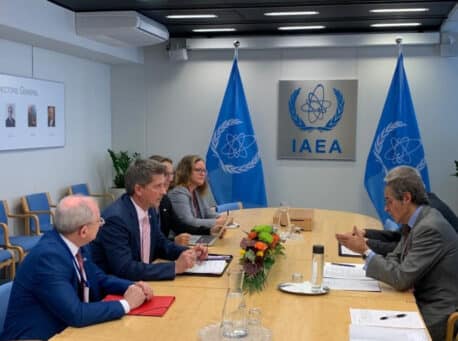The protection of nuclear installations in conflict areas took centre stage at the 67th IAEA General Conference
The 67th General Conference of the International Atomic Energy Agency (IAEA) took place in Vienna from 25 to 29 September 2023. The focus was on global nuclear safety and security, and the crisis in Ukraine. The General Conference was a success for Switzerland; all resolutions relevant for Switzerland were adopted by consensus after intensive negotiations.

Just as last year, the crisis in Ukraine was a key discussion point at this year’s IAEA General Conference. The member states discussed the hostilities in Ukraine as well as the linked topics of nuclear safety, security and safeguards for nuclear installations.
Marc Kenzelmann, Director of the Swiss Federal Nuclear Safety Inspectorate ENSI stated, “We endorse the seven pillars of nuclear safety and security identified by the IAEA, as well as the five principles for safeguarding the Zaporizhzhia nuclear plant“. Through its membership of the IAEA Commission on Safety Standards (CSS), Switzerland is also making an active contribution to the inclusion and application of the lessons learned from the Ukraine conflict in the IAEA Safety Standards.
Swiss priority resolutions adopted by consensus
After intensive negotiations, the delegations of the 177 member states adopted by consensus the resolutions on nuclear safety, nuclear security and safeguards, which are a priority for Switzerland. In addition, Switzerland was also perceived as an active and distinguished player.
The IAEA member states also adopted a resolution calling for the immediate withdrawal of Russian troops from the occupied Zaporizhzhia Nuclear Power Plant. The soldiers must withdraw and the plant must be returned to Ukrainian control. Moreover, the resolution included the requirement that the IAEA observers who are permanently stationed in the NPP, must be given unimpeded access to all areas of the plant. “Switzerland fully supports this resolution and the requirements it includes,” stated Marc Kenzelmann.
Moreover, within the framework of the General Conference, the member states also deliberated the annual report of the IAEA and approved the budget for next year.
Strengthening nuclear safety and security
During the Conference, ENSI recommended taking into account the outcome of the Review Conference of the international Convention on Nuclear Safety in the IAEA documentation on nuclear safety. Close cooperation at a technical level should also be promoted among the member states.
Switzerland also welcomed the fact that the Board of Governors approved the “Code of Conduct on the Safety and Security of Radioactive Sources” 20 years ago. Switzerland has fully implemented this code of conduct and its supplementary guidance and continues to apply it.
Bilateral and multilateral meetings promote valuable exchange of experience
Alongside the official plenary discussions and side events at the Conference, the Swiss delegation also shared experience in bilateral discussions; this year they spoke with the regulatory authorities of the Netherlands, France, Belgium, Sweden, Germany, Finland, Ukraine, the UK and Spain, as well as the IAEA General Director Rafael Grossi and the Deputy IAEA General Director Lydie Evrard. Among other things. they compared notes on deep geological repositories and the long-term operation of nuclear installations.
ENSI is also a member of the Deep Geological Repository Regulators Forum (DGRRF), which regularly exchanges views on the status of work on deep geological disposal. This multilateral cooperation group also took the opportunity to exchange knowledge and information.
In this meeting with representatives from Sweden, Canada, Finland, France and the USA, Marc Kenzelmann had an opportunity to speak about progress in the area of deep geological disposal, “The safe disposal of radioactive waste in deep geological repositories is an important subject for us all. I would like to thank my fellow colleagues for the updates, different perspectives, and constructive discussion.” The DGRRF was set up by the regulatory authorities from Sweden, Canada, Finland, France, the USA and Switzerland. The aim of the group is to share the experiences of the regulatory authorities in the areas of licensing, siting, safety assessment and construction of deep geological repositories.
Marc Kenzelmann becomes the new Chairman of the Commission on Safety Standards:
At a meeting with the IAEA Director General Rafael Mariano Grossi, Marc Kenzelmann was named the new Chairman (2024–2027) of the IAEA Commission on Safety Standards (CSS).
The CSS is a permanent body of the IAEA that comprises high-ranking representatives of various regulatory authorities from all over the world. The Commission adopts the IAEA Safety Standards and discusses important topics in the areas of nuclear, radiation, transport and waste safety, as well as in the area of emergency preparedness. The CSS is reconstituted every four years and receives a new president. Eight years ago the CSS was chaired by the Czech Republic, while for the last four years it has been presided over by Canada.
Marc Kenzelmann: “I would like to warmly thank Director General Rafael Mariano Grossi for the confidence he has placed in me. I am also acutely aware of the responsibility of this office and am already looking forward to taking on this challenge in cooperation with the ENSI team.”
Preliminary information from 28 September 2023
ENSI to take part in the 67th IAEA General Conference in Vienna
The Swiss Federal Nuclear Safety Inspectorate (ENSI) is taking part in the five-day General Conference of the International Atomic Energy Agency (IAEA). The IAEA member states will be meeting in Vienna for the event, from 25th to 29th September. The focus will be on global nuclear safety and security, and the crisis in Ukraine.
The Swiss delegation is composed of representatives of the Swiss Federal Office of Energy, the Swiss Federal Department of Foreign Affairs, the Federal Department of Defence, Civil Protection and Sport, and ENSI.
ENSI will also use the conference as an opportunity to exchange knowledge and information with other regulatory authorities from different countries.

